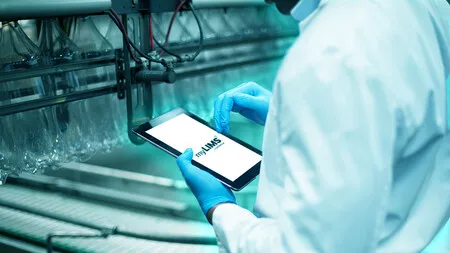August 31, 2025
Business Intelligence in Laboratory Data Analysis
Table of Content

In recent years, the field of laboratory data analysis has undergone a significant revolution, driven by the increasing availability of information and technological advancements. In this context, one of the most powerful tools that have emerged is Business Intelligence (BI).
BI, in turn, is a set of techniques and technologies that allow organizations to collect, organize, analyze, and visualize data to make informed and strategic decisions. In this context, this article explores how Business Intelligence is being used in the analysis of laboratory data, improving the efficiency, accuracy, and quality of results.
The Evolution of Laboratory Data
In laboratories, data generation has always been an essential part of operations. With the advancement of automation and high-tech instrumentation, the amount and complexity of laboratory data has increased exponentially. This includes data from chemical, biological, and other analyses. However, simply generating data is not enough. For this information to be truly valuable, it is necessary to analyze it effectively. This is where Business Intelligence comes in.
Learn More: The Role of LIMS in Driving Digital Transformation
The Role of Business Intelligence in Laboratory Data Analysis
1. Data Collection and Integration
One of the first steps in using BI in laboratory data analysis is the collection and integration of information from various sources. This can include laboratory systems, instrument data, and more. BI is able to unify this heterogeneous data in a single location, allowing for a complete and integrated view.
2. Analysis of Trends and Patterns
One of the main advantages of Business Intelligence (BI) lies in the ability to identify trends and patterns. This is particularly valuable for laboratories that offer specialized services, where early detection of trends can result in more efficient analysis and accurate insights. BI employs advanced algorithms to analyze extensive data sets, highlighting pertinent information to optimize processes and decision-making in that specific context.
3. Decision Making Support
BI provides actionable insights that can support decision-making in the lab. This includes identifying areas that need improvement, optimizing processes, and efficiently allocating resources. Laboratory managers can use this information to make informed decisions that increase operational efficiency.
4. Improved Quality and Accuracy
With the use of BI, laboratories can significantly improve the quality and accuracy of results. Real-time laboratory data analysis can identify errors or deviations quickly, allowing for immediate corrections. This is critical in environments where accuracy is critical, such as food and beverage, environmental and manufacturing laboratories.
5. Data Visualization
The visual presentation of data is another area where BI shines. Charts, dashboards, and interactive reports make data more understandable and accessible to a variety of stakeholders, from laboratory scientists to administrators.
Case Studies
1. Laboratories Providing Services
Laboratories providing services are essential for a variety of industries, from environmental analysis to industrial testing. Business Intelligence (BI) is a key tool used by these laboratories to improve operational efficiency and the quality of the services offered. Through the use of BI, these labs accelerate the analysis of test results, identify trends and valuable insights from the data collected.
This approach drives efficiency in operations, allowing for more informed and agile decision-making. By identifying correlations and patterns in the data, service laboratories can offer more accurate results and more effective services to their customers, whether in water/wastewater, environmental analysis, or other fields.
In summary, the implementation of BI solutions in service provider laboratories improves the quality of the services provided and operational efficiency, meeting the varied needs of different sectors.
Learn More: How LIMS Software Advances Laboratory Innovation
2. Quality Control in Production
In production quality control labs, Business Intelligence (BI) is an essential tool for monitoring and maintaining product quality in real time. It plays a crucial role in the immediate detection of deviations and problems, thus ensuring compliance and product safety at all stages of production.
BI allows QA teams to access and analyze data in real-time, providing valuable insights for instant decision-making. Through continuous monitoring, it is possible to identify any anomalies in products or manufacturing processes, preventing defects and problems that could result in non-conforming products.
In addition, the ability to analyze data in real time also allows the optimization of production processes. By identifying areas of improvement based on BI analytics, companies can improve efficiency, reduce waste, and ensure consistent quality control throughout production.
In conclusion, the use of BI in production quality control laboratories plays a vital role in maintaining quality, preventing problems, and ensuring that products meet established compliance and safety standards. This is critical to the company's reputation and customer satisfaction.
Learn More: Impacts of a Successful LIMS Implementation - A Customer Journey
Challenges and Considerations
While Business Intelligence offers many benefits in analyzing laboratory data, there are challenges to be addressed. This includes ensuring data privacy and security, the need for proper training for laboratory professionals, and the effective integration of legacy systems.
Additionally, choosing the right BI tools and properly configuring systems are crucial for successful implementation.
Conclusion
The implementation of Business Intelligence in laboratory data analysis represents a significant evolution in the way laboratories operate. It empowers experts and scientists to make more informed decisions, improve the quality of results, and increase operational efficiency.
With the continuous advancement of technology and the increase in the availability of data, BI will continue to play a key role in the transformation of laboratories and in the search for excellence in service delivery, contributing to the improvement of processes and effectiveness in laboratory operations.
Ready to optimize your laboratory with Confience myLIMS? We are curious to learn more about the challenges you face and would welcome the opportunity to discuss how we can help! Contact our experts and schedule a demo.
Best-in-class LIMS
Built for your success
See what makes Confience different. Speak with a member of our team.
Schedule a Demo




.webp)


